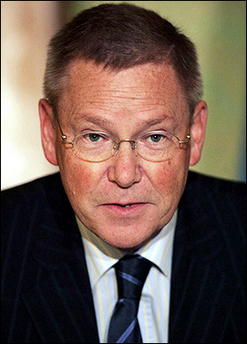 By Nadim Ladki BEIRUT (Reuters) – The leaders of Syria and Lebanon could be fighting for political survival if, as many expect, a U.N. inquiry blames Syrian and pro-Syrian Lebanese officials for the killing of Lebanese former Prime Minister Rafik al-Hariri. Analysts and diplomats say they expect a cycle of bombings and killings to continue or intensify in Lebanon, where Syrian influence remains strong and where pro-Syrians will challenge any such U.N. findings as politically motivated. Chief U.N. investigator Detlev Mehlis presents his report to Secretary-General Kofi Annan on Friday over the February 14 assassination of Hariri and 20 others in a truck bomb in Beirut.Diplomats and Lebanese political sources have told Reuters they expect Mehlis to name some Syrian officials in his report, as well as several pro-Syrian Lebanese officials and others.It was not clear whether the suspects would include members of Syrian President Bashar al-Assad’s inner circle.
By Nadim Ladki BEIRUT (Reuters) – The leaders of Syria and Lebanon could be fighting for political survival if, as many expect, a U.N. inquiry blames Syrian and pro-Syrian Lebanese officials for the killing of Lebanese former Prime Minister Rafik al-Hariri. Analysts and diplomats say they expect a cycle of bombings and killings to continue or intensify in Lebanon, where Syrian influence remains strong and where pro-Syrians will challenge any such U.N. findings as politically motivated. Chief U.N. investigator Detlev Mehlis presents his report to Secretary-General Kofi Annan on Friday over the February 14 assassination of Hariri and 20 others in a truck bomb in Beirut.Diplomats and Lebanese political sources have told Reuters they expect Mehlis to name some Syrian officials in his report, as well as several pro-Syrian Lebanese officials and others.It was not clear whether the suspects would include members of Syrian President Bashar al-Assad’s inner circle.
Four pro-Syrian former security chiefs close to Lebanese President Emile Lahoud are already under arrest in Lebanon on charges of plotting Hariri’s killing.
A Syrian witness among several officials questioned by U.N. investigators last month, Interior Minister Ghazi Kanaan, died last week in what officials said was suicide.
Whatever the circumstances, Kanaan’s death suggested high-level turmoil in Damascus ahead of the Mehlis report.
TENSIONS AT THE TOP
"The death of Ghazi Kanaan shows there are severe tensions at the top, probably an internal power struggle," Patrick Seale, a British writer on the Middle East, told Reuters.
But he said that did not mean Assad’s grip on power was necessarily weakening.
"We have to note that the regime continues to control the army and security services, the Syrian opposition is very weak and America is bogged down in Iraq," Seale said.
"I think the prospects for the survival of the regime are better than many people think."
U.S. Secretary of State Condoleezza Rice said last week the United Nations would need to act on Syria after Mehlis’s report, signaling Washington wanted a tough international stance.
"The (U.N. Security) Council is going to have to be prepared to act in a way that … allows the chips to fall wherever they may," Rice said after talks in Moscow about Syria.
Arab diplomats say a possible deal between Syria and the United States had been mooted in talks involving Egypt and Saudi Arabia, but the discussions had not borne fruit.
Any such agreement would be likely to guarantee the survival of Assad’s government without Syria becoming a pariah state, in return for full cooperation with Mehlis, a crackdown on insurgents crossing into Iraq, and an end to Syrian support to Palestinian and Lebanese militants, the diplomats said.
Assad said last week any Syrian found to have been involved in Hariri’s killing would be regarded as a traitor who should be punished, opening the door to a possible handover of any named Syrian suspects to international justice.
Sateh Noureddine, a columnist at Beirut’s As-Safir newspaper, said there appeared be no international desire at this time for a regime change in Syria.
"Of course there is a list of demands but there is no intention to change (the regime)," Noureddine said.
FEAR OF INSTABILITY
Many analysts say chaos in neighboring Iraq and the absence of any obvious alternative to Syria’s Baathist rulers have reduced U.S. appetite for an upheaval in which military officers or Islamist groups might struggle to fill the power vacuum.
Seale said Washington wanted to deal with Damascus rather than replace Assad and that tough bargaining lay ahead.
"The United States will be setting conditions to try and twist the arm of the regime — conditions that are not acceptable to the Syrians because implementing them would mean the changing of the nature of the regime," he said.
Political sources said Mehlis was likely to complain about "insufficient" Syrian cooperation with his inquiry and might ask to interrogate more Syrian officials, possibly abroad.
Noureddine said Mehlis’s findings would make it almost impossible for Lahoud, a staunch Syrian ally, to stay in office.
"There’ll be no major earthquake in Lebanon. There’ll be only one element: the presidency," he said, adding that the legitimacy of Lahoud had been already in doubt since Syria imposed an extension of his term last year.
"He is the last and worst symbol of the Syrian phase in Lebanon… The other (pro-Syrian politicians) have popular support, but not Lahoud. He’s finished," Noureddine said.
Lebanon’s government, dominated by anti-Syrian ministers, has asked Annan to extend Mehlis’s mission to December 15 to help Lebanese prosecutors draw up indictments against the suspects.
Lebanese authorities have tightened security in and around the capital in case the Mehlis report proves explosive.



